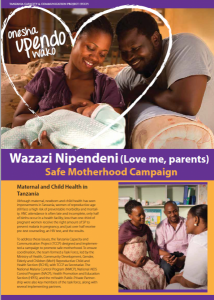Wazazi Nipendeni Report 2017
Wazazi Nipendeni was ocially launched in Mwanza in November 2012.
The goal of the campaign was to empower pregnant women and their partners to take the steps necessary for a healthy pregnancy and safe delivery. The campaign targeted pregnant women and their partners, with birth supporters, women intending to become pregnant, health providers, and local and district leaders as secondary audiences.
The objectives were to increase the proportion of the primary target audience who attends ANC within the first 16 weeks of pregnancy, attends ANC at least four times during pregnancy, sleeps under a treated net every night, receives at least 2 doses of SP for the prevention of malaria in pregnancy, tests for HIV together with their partner, make an individual birth plan, and delivers at a health facility with a skilled provider.
The campaign was informed by Social Cognitive Theory and sought to model key behaviors in characters similar to the target audience, thereby increasing self and collective e_cacy. The tone was meant to be empowering, emotional, caring, and loving.
Source: Johns Hopkins Center for Communication Programs
Date of Publication: March 25, 2019
SIMILIAR RESOURCES
Tools
Examples
- Gapminder
- Factors Impacting Use of Health Services by First-time/Young parents: A Formative Research Toolkit
- “Because my Husband and I Have Never Had a Baby Before…” Results and Lessons from Interventions with First-Time Parents in Madagascar, Mozambique, and Nigeria
- Engaging the Private Sector in Maternal and Neonatal Health in Low and Middle Income Countries
- FGM: The Scope of the Problem in Graphics and Numbers
- Social Behavior Change Programming for Public Health Emergencies: Lessons Learned from the USAID Zika Response in Latin America and the Caribbean
- Transforming Inequalities, Transforming Lives
- How Businesses Can Invest in Women and Realize Returns
- Beyond the ABCs of FTPs: A Deep Dive into Emerging Considerations for First Time Parent Programs
- Global Strategy to Stop Health-Care Providers from Performing Female Genital Mutilation

